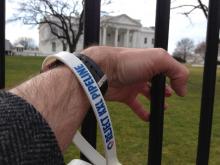ash wednesday

Today is Ash Wednesday and the beginning of Lent. I grew up in a small evangelical church that only paid attention to the Christian calendar on Christmas and Easter. But over many years now, I have learned to celebrate the richness of all the Christian seasons from my friends in more liturgical traditions and from marrying a Church of England priest!
Lent offers us the much-needed spiritual preparation for Easter. Ash Wednesday is the place to begin; and that often includes fasting — in different ways and traditions. At Sojourners, we usually have a big staff pancake breakfast on Shrove Tuesday morning, the day before Ash Wednesday. But today, many of us are fasting.
Ash Wednesday doesn’t begin a hunger strike, but rather a season of self-examination, spiritual reflection, repentance, sacrifice, and focused prayer. Lent is a time to examine our hearts and lives, to acknowledge our sins, to look for the ways we are not choosing the gospel or welcoming those whom Jesus calls us to.

This Wednesday marks the beginning of Lent with Ash Wednesday. For Christians, Lent is a 40-day season of fasting, reflection, and penance culminating in Holy Week and the Easter Sunday commemoration of Jesus’ Resurrection.
The Rev. Arne Panula, director of the Catholic Information Center in Washington, D.C., said his experience is that more people go to church on Ash Wednesday than any other holiday, including Christmas and Easter.
Here are a few basics on the Ash Wednesday tradition.

I stepped off the elevator and was greeted by three men with hoodies in church yesterday. My shoulders tensed for a few moments. Growing up in New York City, I’ve been groomed in paranoia and 20/20 peripheral eyesight. Yet after taking a second look, I smiled as I admired the theater props: Three hooded figures containing the faces of Hillary Clinton, Jay Z, and Trayvon Martin, with a caption reading, “We are Trayvon Martin.”
Metro Hope Church meets weekly at Harlem’s National Black Theater, so our church gatherings can often be a dance in improvisation as we’re frequently welcomed by new sets. One summer we were greeted by a gigantic “tree” protruding from center stage. It made this preacher’s imagination run vivid with all sorts of sermon possibilities.
But the hooded figures that greeted me last Sunday were a tribute to Trayvon Martin called, Facing our Truth: 10 Minute Plays on Race and Privilege. This month also happens to be the month that Trayvon Martin was born, and a month for celebration of Black History. These convergences do not escape me, nor does the distinct mission of our church in Harlem.
No stranger to dialogue on race and privilege, our church will often reflect on Dr. King who once lamented, “We must face the fact that in America, the church is still the most segregated major institution in America … 11:00 on Sunday morning …we stand at the most segregated hour in this nation.”

With the exception of “WWJD” bracelets, there are few times when outward physical appearance reveals Jesus followers in the public square. Other religions often require their faithful to move through the mundane activities of life outwardly proclaiming the core of their faith. For the traditional Hindi it is the saree or the sherwani. For the Muslim it may be the kurta or hijab; for the traditional Jew the yamaka or headscarf. Every day around the world these men and women move through life, often in cultures unlike their own — marked.
Once a year the global body of Christ reveals itself to the world en masse. Foreheads marked with ashes, the global church moves through the first day of Lent with the sign of the cross in plain view for all to see. In the midst of the mundane, those ashes blend with sweat and soot and reveal to the world just who is a follower of Jesus in their midst.
It is a profound feeling to move through the streets of Washington, D.C., New York, Los Angeles, Cincinnati, or Huntsville, Ala., with your deepest beliefs marked on your forehead.
The Lenten mark of the cross, in tangible form, brings the church into solidarity with Jesus’ 40-day struggle in the wilderness — the place of desolation, the place of waiting and wandering, temptation, and confrontation with the limitations of our human-ness.
IN HER LATEST book, Sara Miles—author of the spiritual memoirs Take This Bread and Jesus Freak—goes where traditional and liturgical churches don’t regularly go: into the streets to push the boundaries of public worship. City of God chronicles a day in the life in San Francisco’s Mission District, on one Ash Wednesday when Miles and others from St. Gregory of Nyssa Episcopal Church offer “Ashes to Go,” a growing national movement within the Episcopal Church to perform the imposition of ashes outside the church walls on the first day of Lent.
Ash Wednesday works on the street because it has a broad ability to speak to people with “different beliefs about God and very different relationships to the church.” Even so, carrying the observance away from the altar has generated critics. Some liturgists have wondered if, without a proper church context, “the ashes become a meaningless affirmation of our earthly life,” or whether regular folks on the street can really appreciate the profundity of the human condition and mortality without the church to explain it to them. Trusting that people on the street will “get it,” Miles embarked on a day of crossing the traditional borders of worship space to smudge foreheads in McDonald’s, taquerias, hair salons, and botanicas.
Miles finds that traditional observance of liturgies such as Ash Wednesday helps reclaim the public language of sin and repentance in a progressive way. This kind of re-evaluation of sin in common life led her to realize how she’s also fallen short of the call to solidarity and deep communion with the city. “I aspired to be the kind of neighbor who knew everyone,” she writes, “I yearned to be in real relationship.” But her admittedly self-satisfied sense of fellowship didn’t match up to her interactions. She hadn’t even bothered to learn the last name of a young Latino activist on her block and confesses, “I prayed for my neighbors, but not so much with them, and it made me uncomfortable.”

If one were to conduct a nationwide survey to learn the most common human fears, it is safe to conclude thatfailure would be near the top of the list. Due in part to the high value that North American society places upon success and achievement, we recognize through the twists and turns of daily life that everyone has – in some shape or form – firsthand experience of the fear of failure. We fret over falling short, we agonize about disappointment, and we even lose sleep from the potential shame of letting others down.
What if we, as a Lenten discipline, make a commitment to give up the fear of failure — for such fears are too often personally devastating and publicly debilitating if left ignored or unresolved?

I awoke in the middle of the night last evening and walked the house in the dark. Kenneth and Caitlin were still stirring, as the older children sometimes do on the weekend. As I climbed the stairs back to our room I felt a wave of gratitude.
Here we are all under one roof for who knows how much longer, yet such a privilege to still be together even as four of seven attend college and work hard and make us proud as they figure out what's next.
I got back into bed and Debbie put her arm around me in her sleep. I said "I love you," and she whispered, half-asleep "I love you, too," and for that moment all was well, and I had a sense that all would be well in the future, come what may.
As I lay there in the stillness, an encounter from five years ago came back to me in vivid color. I had just preached the funeral of a man taken unexpectedly following a routine surgery. I was at the wake afterward and sat next to an unassuming man in his mid-50s whose suit was impeccable and whose polite manners suggested a quiet grace and a bearing of humility in his obvious accomplishments, but also a bit of world-weariness.

My wrist was cuffed to the White House fence next to the wrist of Robert F. Kennedy, Jr. Our nation’s chief climate scientist James Hanson stood next to me; Daryl Hannah sat in front of us. A few feet away, also cuffed to the fence, Julian Bond stood next to Bill McKibben and Michael Brune, Executive Director of the Sierra Club. Altogether, 48 of us from all over America obeyed our consciences. The days of safety and silence have ended. The time of pretending is over. Humanity will be held accountable for our desecration of creation. It is happening already.
And it was Ash Wednesday. When I mounted the platform to address the rally that preceded our civil disobedience, many were unaware that Lent was beginning. In the context of climate disruption, anyone who cares about creation can embrace the significance of Ash Wednesday. It’s a day of conscience, repentance, and conviction; a day when we take stock of our lives and our life together on the planet; a day when we confess our self-indulgent appetites, our intemperate love of worldly goods and comforts, and our obsession with consumption of every kind. For Christians, Ash Wednesday is a day to acknowledge that we are accountable to the God who gave us life and who entrusted the earth to our care.
Ash Wednesday is a good day to be arrested, I told the crowd. It’s a good day to realign our lives with God's desire to preserve this good creation. I invited any who wanted to receive ashes as a sign of their repentance to approach me on their way to White House.

Use this Lenten season as a time to grow closer to God and simplify your life. Try a new suggestion from this list each day and experience the stronger relationships and calmer pace of an (almost) Amish lifestyle!
1. Start a giveaway box and add at least three items of clothes you have not worn in the last year.
2. Is there a form of technology that is ruling you like a master rather than serving you like a tool? Unplug for 24 hours and rediscover the peace that passes all understanding.

A day of darkness and gloom, a day of clouds and thick darkness!
-Joel 2:2
Who in their right mind looks forward to Lent? Seven weeks of preparation to lead up to Good Friday hardly seems like an enjoyable way to spend our time.
Why not work on those New Year’s resolutions that have already been slipping instead? How about some more quality time with the family? What good, after all, can come from dwelling on darkness and death for more than forty days?
How about we all just agree to skip Lent this year and just get back together on Easter, okay?

Lent is a time when we try to identify with our own weakness, so since we are about to start the Church’s penitent season, it was shocking to read Virgilio Elizondo’s account of how a people generally considered weak on the geopolitical stage – poor Mexicans and Chicanos – do not treat Ash Wednesday as a day of penitence at all.
“For the masses of the people, it has little to do with the beginning of Lent. Lent as a season of self-sacrifice is not really of special interest to the people: the entire year is a time of suffering and abnegation. On Ash Wednesday Mexican-Americans renew their cultic communion with mother earth. For them the earth has always been sacred and they retain a fundamental identity with it. The earth supports and regenerates life; itis life.”
What a beautiful and unexpected connection!

Deep with one savior’s death, how many more?
In observance of which, the Dresden burghers
as usual held Shrove Tuesday circuses
around Our Lady’s Church, the Frauenkirche,
eating pancakes before their fast for Easter.

Repentance has a public aspect and a private aspect. Jesus speaks very clearly about doing one’s repentance in secret -- not chattering on in public about how hungry your pious fasting has left you. At the same time, the church also has a ministry to call -- publicly -- for repentance, to sometimes play the role of John the Baptist. Calls for repentance happen every week, every day, inside religious buildings, inside religious communities. Sometimes calls for repentance need to happen out on the street corners, too.
Still, this is a strange thing to do, this liturgy outside a hospital. It does not feel entirely comfortable to me -- but I am not sure anything about Ash Wednesday ever feels entirely comfortable.

Five years ago, the Rev. Teresa K.M. Danieley had an epiphany of sorts. If people can grab breakfast on the go or pay a bill from their cell phone, she thought, why shouldn't they be able to get their ashes in a flash?
That's why, on Ash Wednesday 2007, Danieley planted herself in full priestly regalia at a busy intersection in St. Louis, smudging the sign of the cross on the foreheads of bicyclists, drivers and bus passengers.
This year, at least 49 Episcopal parishes across 12 states will offer ashes to passersby at train stations, bus stops and college campuses on Ash Wednesday (Feb. 22) as Danieley's "Ashes to Go" concept spreads nationwide.

All the major world religions have an element of self-denial at their core. Jews have Yom Kippur.Muslims have Ramadan.Christians have Lent.
In a world filled with clutter, noise, and hustle, Lent is a good excuse to step back and rethink how we think and live.In a world of instant gratification, it’s a chance to practice delayed gratification – to fast -- so that we can truly appreciate the blessings we have.In a world where virtual friends are replacing real ones, it is an invitation to turn off TV and computer screens so we can spend time with real people again.
It’s an opportunity to give up something that is sucking the life out of us so that we can be filled with God, with life, with love again.

On Ash Wednesday, Catholics and many others will walk around with ashen crosses (or, by the end of the day, what look like indeterminate smudges) on our foreheads. Those ashes are strong symbols of core principles of the Catholic faith — symbols of repentance, identity, reconciliation, and renewal of baptism in the faith.
As a voting rights lawyer who is about as passionate about my work as I am about my faith, I can’t help but see parallels between the moral guidance I am given by my faith, and the policy choices that confront us in the secular world. These principles are reflected in the way we worship – and also in the actions we take in the secular world. This has led me and others to the conclusion that the 4 million Americans who lost their voting rights while incarcerated, and now live in our communities, deserve the chance to vote again upon release. It is both the just and the moral thing to do.
As we approach Ash Wednesday during this Holy Season, I encourage all Christians, guided by their core beliefs, to consider this idea.

This coming Wednesday, Febr. 22, is Ash Wednesday. The following new hymn is based on the Revised Common Lectionary’s assigned reading of Isaiah 58:1-12 with its social justice themes.
O God of Love, the Fast You Choose
KINGSFOLD CMD (“Today We All Are Called to Be Disciples”)
O God of love, the fast you choose is not some great display.
It’s everything we gladly do to serve you day by day.
It’s not a moment set apart when we will mourn our sin;
For you require a change of heart— a change from what has been....